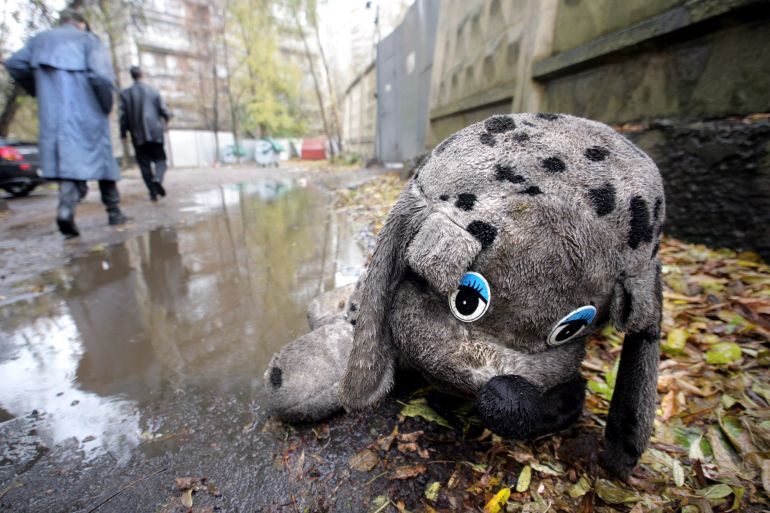Doctors Without Borders halts Russian operations after losing legal status
The aid group announced the decision with ‘a heavy heart’ after losing its legal authorisation.
A toy dog lays in a puddle in front of the entrance to MSF’s street children’s centre in Moscow [Alexander Nemenov/AFP]Published On 17 Sep 202417 Sep 2024
Doctors Without Borders has said it has halted its operations in Russia after Moscow removed its authorisation to work in the country.
The NGO, also known as Medecins Sans Frontieres (MSF), announced the decision late on Monday, saying it was compelled to stop activities because Russia’s justice ministry had removed it from a roster of approved foreign charities.
“It is with a heavy heart that we have to close our activities in Russia,” said a statement by MSF, which employed more than 50 people in Russia.
“To comply with the [justice ministry] decision, we had to close our operations in the country and terminate the contracts of our staff in accordance with all legal requirements,” spokeswoman Maria Borscheva told the AFP news agency.
The decision applied to the Dutch branch of MSF in Russia but since this was the only association active in the country, it effectively ended the group’s presence there.
A branch office dealing with nonoperational activities in Moscow will stay open, according to the group.
The move puts MSF, which has operated in Russia for 32 years, as part of a growing list of foreign charities pushed out during the Ukraine war.
Last year, Russia declared Western aid groups Greenpeace, Transparency International and World Wide Fund for Nature “undesirable,” effectively banning them from operating in the country.
Kursk aid
With a mission to offer medical assistance to “people affected by conflict, epidemics, disasters, or exclusion from healthcare”, MSF has been in Russia since 1992, operating programmes that give aid to homeless people and migrants, tuberculosis treatment and general healthcare.
Russian doctors working for MSF take care of homeless people, most of whom suffer from various skin diseases, at the Kursky railway station in Moscow, on March 2, 1993 [Michael Evstafiev/AFP]
Since the invasion of Ukraine, its aid operations have reached 52,000 refugees and displaced people, 15,400 of whom have received free medical, mental health and psychosocial support, the NGO said.
One of its most recent goals was to respond to the humanitarian and medical needs of the internally displaced people in Russia’s Kursk region, where Ukrainian forces have recently made inroads, it noted.
“We are very sad to conclude our programmes in the country as many people in need of medical and humanitarian assistance will now be left without the support we could have provided to them,” said Norman Sitali, MSF operations manager in Russia.
“MSF would like to still work in Russia again, if and when possible,” added Sitali.
